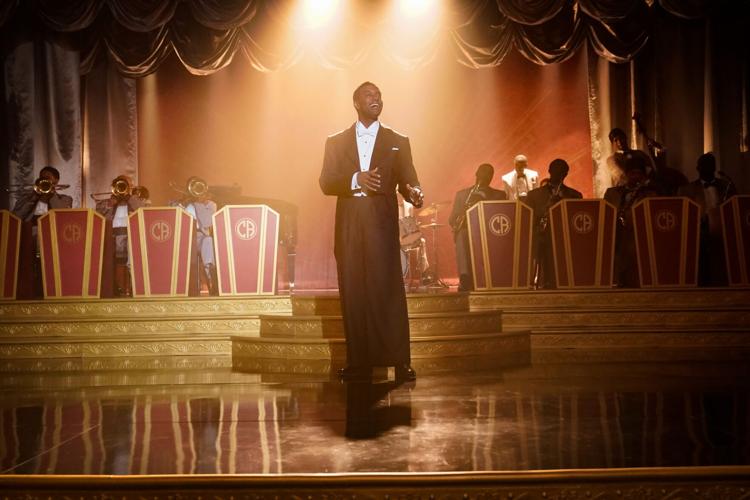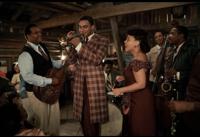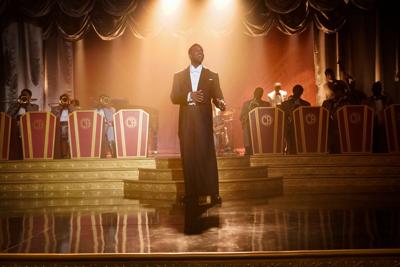Editor’s note: The views and opinions expressed in this review are solely those of Marlon Wallace and do not necessarily reflect the views and opinions of WBOC.
Tyler Perry has now directed 23 features. Most of them have included his iconic character “Madea.” A few have included Perry himself as an actor in one role or another. This is likely his fifth major motion picture that doesn’t have himself as an actor. It’s a dramatic story, which are about a third of what Perry does. Of all of those dramatic films, this is by far the best that Perry has ever done. After 20 years or so in the business, this is likely his magna cum laude. It’s so far his masterpiece. There are things about the film that remind us that it is from Tyler Perry, but some of the writing, acting and directing here are some of the best I’ve seen from the playwright-turned-media mogul. It’s also the first Tyler Perry film to premiere at a film festival, which it did at the 47th Toronto International Film Festival (TIFF). Not every film that plays at a film festival, even one as prestigious as TIFF, is great, but it’s a show of faith for its quality, if it is presented at someplace like TIFF.
Joshua Boone (Premature and Seven Seconds) stars as Bayou Boyd, a young, African American living in Georgia in the early 20th century. In fact, when we first meet him, it’s 1937 and he’s 17 years-old. He lives with his parents and older brother in a town called Summerville, which is a rural area. His mother works as a de facto nurse or in healthcare. If people get sick or need help giving birth, they go to Bayou’s mother. His father though is a musician, or an aspiring one. He performs in Summerville, but he wants to make it big in Chicago. Bayou’s father is frustrated that he isn’t there yet, so he takes out his frustration on Bayou. Bayou’s father comes across as somewhat abusive.

Solea Pfeiffer (The Good Fight and Scandal) co-stars as Leanne, a young woman living in Summerville. She comes from an abusive home, a more abusive one than Bayou’s. She meets and literally falls for Bayou. In a funny, if not on-the-nose bit of filmmaking, Perry has her literally fall out of a tree and land on Bayou. She learns that Bayou is illiterate, so she decides to teach him how to read. They have to do so secretly, given that her parents are so abusively protective of her. Her mother in fact doesn’t want her dating or being involved with Black men. Leanne herself seems to be biracial, if mostly appearing as she could be a White woman.
The film follows Bayou and Leanne’s lives over the course of the next decade, as we see the circumstances that bring together and pull them apart. Bayou eventually rises to be a successful Jazz and Blues singer. Leanne gets married to another man. If anyone has seen Eugene Ashe’s Emmy-nominated film, Sylvie’s Love (2020), then there will be elements of Perry’s film that will feel familiar. Ashe’s film isn’t as melodramatic and even though it also takes place in a pre-Civil Rights Movement era, Ashe’s film is more about feminist issues of a woman trying to have a career. Perry’s film is more about reckoning with the horrors of racism and bigotry.

Amirah Vann (How To Get Away With Murder and Underground) also co-stars as Hattie Mae, the mother to Bayou and his brother. She refuses to work for White people, even while living in 1930’s Georgia. She finds her way in other ways. She eventually becomes a single mother but still is able to open her own juke joint. She starts making a living as a Jazz and Blues singer herself who eventually invites her two sons to sing with her. Both her sons can sing. One is more into music than the other and she tries not to show favoritism, but a schism still forms between the two brothers.
Austin Scott is an actor more known in Broadway theater, but Scott also co-stars here as Willie Earl, the older brother to Bayou. Willie Earl is the one who is more into music than Bayou. The film doesn’t spell out why, but there certainly is a bit of sibling rivalry at least on Willie Earl’s part, even before the schism forms. Willie Earl constantly bullies his younger brother. When Bayou starts to get success as a singer instead, Willie Earl gets jealous and this pushes him to extremes. Scott gives a great performance, but Perry’s script perhaps rushes through some story and character beats with Willie Earl that needed more time to marinate.

The pacing and the filmmaking otherwise is solid enough that whatever issues with the Willie Earl character don’t feel as detrimental. Scott as an actor is an engaging presence here and Scott is an actor who also comes from Perry’s series Sistas (2019). Yet, his character isn’t all that required. The real crux of this film is about the obstacles between Bayou and Leanne. Arguably, Willie Earl becomes one of those obstacles and perhaps the ultimate obstacle, but the aspects involving Willie Earl don’t feel as vital as perhaps they could have.
Ryan Eggold (New Amsterdam and The Blacklist) plays Ira, the talent manager for Willie Earl. He is revealed to be German and Jewish who survived the Holocaust. He decides to represent Black artists in the United States who are struggling to make a career in the music industry. He’s able to understand a little bit of the persecution against Black people because as a Jew, he experienced similar persecution first-hand himself. He’s a very warm and calming presence that’s much appreciated here.

There’s a lot happening though, possibly too much, but Perry balances it all reasonably well. Yes, it begins with a kind of Sylvie’s Love story line here. There’s a rather abridged version of Lady Sings the Blues (1972) but gender-swapped as more “Fella Sings the Blues.” In the first third of the film, there’s vibes of Where the Crawdad Sings (2022), a recent film about a young woman living in the South, specifically a bayou, who is illiterate. She falls in love with someone who teaches her to read and eventually she becomes accused of a crime. That’s exactly the path of Perry’s protagonist here, only he’s literally named Bayou.
Perry also weaves in a story line that will feel familiar to those who saw Rebecca Hall’s Passing (2021), which is about a woman who is African-American in descent or heritage but who presents herself as a White woman, totally denying her Black background in order to marry a White man in the pre-Civil Rights era. There are a lot of compelling things about Hall’s film, which features great nuance and insight, but Perry’s film really underscores the danger and the push-and-pull in a really potent way. Perry also has a framing device here that’s akin to James Cameron’s Titanic (1997) but it’s a framing device that packs more of a wallop. It’s also not as intrusive as in Cameron’s film. It’s more of a bookend but a powerful one. I also really loved the song in the film “Paper Airplanes” by Ruth B. and Terence Blanchard.

Rated R for drug use, rape, sexuality and language.
Running Time: 2 hrs. and 8 mins.
Available on Netflix.

































